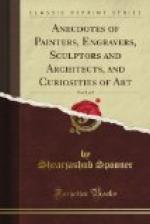Buffalmacco, the successor of Giotto,
ii, 267;
his comical Tricks to enjoy
his sweetest Sleep, ii, 268;
his Employment by the Nuns
of Faenza, ii, 270;
his Use of their best wine,
ii, 272;
his Employment by Bishop Guido,
ii, 273;
Comical Pranks of the Bishop’s
Monkey, ii, 274;
his Trick on the Bishop, ii,
277;
Origin of Libel Painting,
ii, 278;
Utility of ancient paintings, ii, 280;
his Commission from the Countryman,
and its curious execution, ii, 282;
his Commission from the Perugians,
ii, 283;
their Impertinence requited,
ii, 284;
his Novel Mode of enforcing
Payment, ii, 285.
Callot, Jacques, iii, 176;
his uncontrollable Passion
for Art, iii, 176;
his Patriotism, iii, 177.
Callimachus—his invention of the Corinthian Capital, i, 152.
Cambiaso, Luca—his Precocity
and remarkable Facility of Hand, iii, 187;
his Invitation to Spain, iii,
188;
Luca and Philip II., iii,
189;
his Artistic Merits, iii,
190;
Boschini and Mengs’
Opinions, iii, 190.
Campaspe and Apelles, i, 21.
Campus Martius, i, 91.
Cano, Alonso, i, 230;
his Liberality, i, 231;
his Eccentricities, i, 231;
his Hatred of the Jews, i,
232;
his Ruling Passion strong
in Death, i, 234;
Cano and the Intendant of
the Bishop of Malaga, iii, 203;
his love of Sculpture, iii,
204.
Canova—his Visit to his Native Place in his old age, i, 32.
Capitol, ancient, of Rome, iii, 59.
Capugnano and Lionello Spada, iii, 247.
Caracci, the School of, ii, 122.
Caracci, Annibale—his Letter
to Lodovico, and his Opinion of the
Works of Correggio, i, 253;
instance of his Skill, ii,
137;
his Jealousy of Agostino,
iii, 258.
Carburi, Count—his Skill in Engineering, iii, 42.
Caracciolo, Gio. Battista—his Intrigues, ii, 128.
Carducci, Bartolomeo—his kind Criticism, iii, 203.
Carlos, the Four, of the 17th Century, ii, 184.
Caravaggio, Michael Angelo da—his
Quarrelsome Disposition
and his Death, iii, 248.
Carreno, Don Juan, and Charles II, iii,
208;
his Copy of Titian’s
St. Margaret, iii, 208;
his Abstraction of Mind, iii,
209.
Castagno, Andrea del, his Treachery and Death, ii, 144.
Castillo’s Sarcasm on Alfaro, iii, 204.
Catacombs of Egypt, iii, 12.
Catino, the Sagro, or Emerald Dish, iii, 215.
Cellini, Benvenute, iii, 255;
Cellini and Urban VIII;
his absolution for sins committed
in the service of the
Church, iii, 255.
Cespedes, Pablo—his Last Supper,
iii, 209;
Zuccaro’s Compliment
to Cespedes, iii, 210.
Chair of St. Peter, iii, 213.




